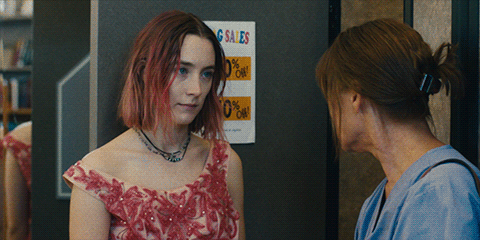I kind of knew I was going to love Lady Bird, Greta Gerwig’s new coming of age film about a young woman who can’t wait to get out of Sacramento, before I saw it. The loosely autobiographical story is about Christine “Lady Bird” McPherson (played by Saoirse Ronan), who, like Gerwig, goes to Catholic High School, but longs for New York, “or at least Connecticut or New Hampshire, where writers live in the woods.”
I also spent my high school career pining for New York City. I lived in New Jersey, so much closer to the Promised Land than California, yet still what felt like an entire universe away. On Saturdays my parents would let me take the NJTransit to Penn Station. My friends and I would walk all the way to the East Village, to Soho, even to Tribeca, and watch New Yorkers like we were watching our future selves in our grandest fantasies — when we had made it as writers, artists, and adults who could live wherever we pleased and stay out after the last train back to Princeton Junction.
Spoiler alert: I was right; I loved Lady Bird.
The film follows the protagonist through her senior year in 2002, a year after the 9/11 attacks. When Lady Bird tells her best friend she wants to go to college in New York, the friend asks, “What about terrorism?”
“Don’t be Republican,” Lady Bird replies.
That’s what High School Me wishes she had been clever enough to say.
Wit is an essential part of the emotional terrain that feels so exquisitely mapped in this film — as is earnestness, awkwardness, pain, frustration, and longing. At the center of the story is Lady Bird trying to figure out who she is. When asked for her given name, Christine/Lady Bird points out that the name Lady Bird “was given by myself to myself.” (Lady Bird! I love it. So retro and weirdly pretty. And precise: Lady Bird wants to be a grown-up, and to fly the hell away.)
The whole name situation, her desire to be called Lady Bird and not Christine, is a perfect symbol for that teenage/young adult quest to decipher who we are, what is our own and what is our parents’, what we want to take from the people who made us and raised us and what we want to abandon. Lady Bird tries on different identities as easily as different clothes, including a stint acting in the school theater production, befriending the archetypal popular girl, and leaving a giggly boyfriend for a brooding cruel one.
It was the mother/daughter dynamic in this movie — uncomfortably intense — that hit closest to home. The movie opens with the two women sleeping side by side in a hotel room, on Lady Bird’s college tour. Then Lady Bird and her mom Marion (Laurie Metcalf) are on the road, listening to “The Grapes of Wrath” on audiobook, tearing up together. It’s moving and lovely. And then, in a flash, there’s an argument that escalates quickly, almost instantly, and Lady Bird has opened the passenger door and flung herself onto the pavement in a stellar display of dramatic teenage antics.
Teenage me was too much of a wuss to make such treacherous moves, but I remember the feeling of boiling with rage re: something my mom said or did, or something I merely imagined she said or did. Lady Bird and her mom’s relationship is defined by their “strong personalities,” as the dad says, and the movie brilliantly captures the way the women get and stay under each other’s skin. In Lady Bird, the closeness of mom and daughter only intensifies the hostility and alienation that sometimes borders dangerously on hatred. The pendulum swings back and forth between adoration and aggression. It’s too real.
One of my favorite scenes happens in a dressing room, the setting of many of my own worst fights with my mom. Lady Bird is trying on dresses for prom.
“Do you like me?” Lady Bird asks.
“Of course I love you,” her mom replies.
“But do you like me?” she wants to know.
These days, my mom and I like each other plenty. Last year, we went on an epic trip to Rome and Tuscany. We walked until our feet ached, ate our body weight in pasta and gelato, drank juicy red wine, and even tried on fancy Italian clothes without any dressing room hysterics. We didn’t fight, not even once. Sure, we hurt each other’s feelings sometimes. But time has shifted something in a really positive, profound way.
I left the theater wanting to tell Lady Bird that it’s going to get better. You’re going to go to New York and realize your dreams are even more complicated and magnificent than you ever imagined. You’re going to love your mom fiercely, and she will love you with more love than you can understand, and maybe like you, too — who you have always been and who you will become.



